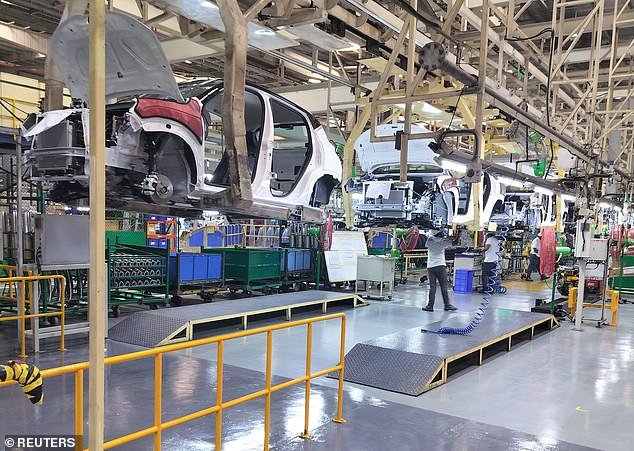Car production took a hefty hit last month hitting a 70-year low.
Just 59,203 vehicles were made in April as car and commercial vehicle production fell by 15 per cent, the latest figures from the Society of Motor Manufacturers and Traders (SMMT) show.
The number of cars rolling off UK assembly lines dropped by 8.6 per cent, while the output of vans and commercial vehicles slumped by a massive 68.8 per cent, marking the lowest April since 1952 – the year Elizabeth II became Queen.
Only in 2020, when the first Covid lockdown effectively shuttered car factories, has output been lower.
April’s decline has been driven by a number of factors including Easter falling later this year, model changeovers as the switch to electric driving ramps up, and a drop in demand in key export markets as tariff fears weighed heavy.
The SMMT is hoping that new trade deals with the EU, US and India will provide opportunities for future growth, but chief executive Mike Hawes is pushing for ‘additional investment’ such as the reported £41million Toyota will spend building its GR Corolla hot hatch in Derbyshire.

In April Britain had its worse month of car production since 1952, bar 2020 when COVID effectively ceased output, with overall vehicle production down 15%
April’s slump of 16 per cent compared to the same month last year, and the 25 per cent drop on March when numbers were helped by an increase in shipments to the US before Trump’s tariffs took effect, cap off the sector’s lowest start to a year since 2009.
Critically, car export production fell by 10.1 per cent, caused by falls in demand to Britain’s best markets, the EU and US.
Exports to the EU fell 19.1 per cent, while US exports fell by 2.7 per cent, although the EU still took more than half of all exports while the US received 16.5 per cent.
Conversely, exports to China and Turkey rose by 44 per cent and 31.2 per cent respectively.
There were fewer production days in the month due to Easter falling between 18 and 20 of the month, which reduced April’s output compared to the rise in output in March, the SMMT said.
Amid economic uncertainty and rapidly changing global trading conditions, the SMMT has stressed the need for the government’s eagerly awaited industrial strategy to ‘contain measures that boost the competitiveness of Britain’s most valuable export sector’.

April’s low figures have been put down to Easter falling late meaning there were less production days in the month and trade issues as Trump’s tariffs came into play

While tariffs have hit vehicle production, the UK could be seen as ‘bridge’ to the US markets, with Toyota reportedly moving its GR Corolla production to the UK to cut wait times for buyers in North America and satisfy the massive demand there

The GR Corolla production line will be set up at the Burnaston plant in Derbyshire, with the £41 million used to produce 10,000 cars annually to export to North American customers
April 1952 was the last time motor outputs were that low – that year, 53,517 vehicles were produced.
Mike Hawes, SMMT chief executive, said: ‘With automotive manufacturing experiencing its toughest start to the year since 2009, urgent action is needed to boost domestic demand and our international competitiveness.
‘To take advantage of these trading opportunities we must secure additional investment which will depend on the competitiveness and confidence that can be provided by a comprehensive and innovative long-term industrial strategy.’
However, industry sources have reason to be optimistic with some new investment in UK car manufacturing announced recently.

The government has successfully negotiated better trading conditions with the US but SMMT Chief Executive Mike Hawes is urging the Prime Minister 9pictured) to go further with ‘urgent action needed to boost domestic demand and our international competitiveness’

Nissan has revealed that two of its new EVs, the updated Leaf and new Juke, will be built at Sunderland promoting UK car production and jobs
This is Money reported yesterday that Toyota is looking to invest £41million building the GR Corolla hot hatch at its Burnaston plant in Derbyshire to capatilise on the sizeable market in the US and reduce wait times to its North American customers.
It’s also a sign of Britain’s attractiveness to firms as the UK-US trade deal – the US has reduced tariffs from 25 per cent to 10 per cent for up to 100,000 UK-made cars per year – makes the UK a desirable place to set up factories and ‘act as a bridge between the US and EU’.
Struggling car maker Nissan recently confirmed that its new Leaf and Juke EVs will be built at its Sunderland plant before the end of next year, a positive sign for the future of the UK’s biggest car factory which employs around 6,000 people.
The Government followed with an announced that it will give a £1billion loan to Nissan to secure jobs as the Japanese manufacturer embarks on a £1.3bn cost-saving plan which will see seven plants close globally and 20,000 jobs culled.


